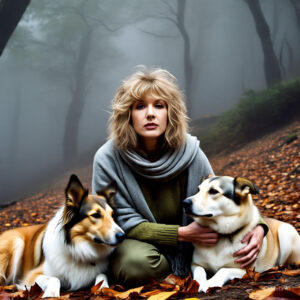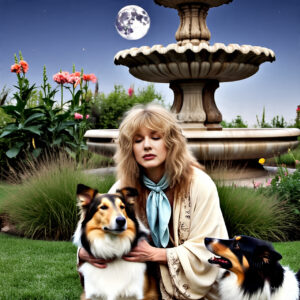“Run and fetch the stick”: Robert Plant, Strider, and a Lifetime Tied to Four Paws
Robert Plant’s leonine mane and primordial howl might suggest a man forever chasing the distant horizon, yet the former Led Zeppelin front-man has long balanced that wanderlust with something wonderfully earth-bound: the steady thump of a dog’s tail against his boot. Across five decades of touring caravans, mist-drenched Welsh cottages, and sun-baked Moroccan riads, Plant’s truest travel companions have not been limousines or hangers-on but canines—chief among them a sable-coated collie named Strider.
A Name Pulled From Middle-earth
Plant, an avowed Tolkien devotee, borrowed his dog’s name from Aragorn’s early alias in The Lord of the Rings. The choice was more than a bit of fandom; it captured what Plant saw in the pup’s gait: purposeful, watchful, ready to course across wild country at a whistle. In interviews he recalled first meeting the collie as a “gangly, bright-eyed rascal who looked as though he’d already mapped ten miles of sheep trail in his head.” The bond was instantaneous, and Strider soon occupied the passenger seat of Plant’s Land Rover, nose pressed to every windowpane of a peripatetic life.
Bron-Y-Aur and the Song of Companionship
In 1970, the band decamped to Bron-Y-Aur, a remote stone cottage in Snowdonia, to shed arena decibels and rediscover acoustic roots. There, amid peat smoke and mountain silence, Strider became both mascot and muse. Led Zeppelin III’s “Bron-Y-Aur Stomp” captures the cottage’s pastoral spell and Plant’s unabashed affection for his dog:

“Ain’t no companion like a blue-eyed merle, Come on, Strider, let’s go for a whirl.”
With Jimmy Page’s jaunty open-tuned guitar and John Bonham’s lapslap boot percussion, the track is less stomp than rollicking hill-run, Plant whooping encouragement while Strider bounds ahead, his claws clicking the slate porch. Fans often read the lyric as a carefree love song; Plant later clarified it was addressed to “a friend with four legs who never complained when the firewood ran low.”
Backstage Passes and Country Lanes
Unlike many rock stars’ pets, Strider rarely languished in kennels. Plant insisted on dog-friendly lodging and was known to produce a frayed lanyard labeled “AAA—All-Area Animal.” Roadies recounted Strider curled at the side-fill monitors, impervious to reverb storms, occasionally trotting out to sniff Page’s double-neck then retreating once the pyrotechnics flared. Yet Plant drew a line: stadium crowds were no place for a collie’s ears, so on gig nights local handlers walked Strider along canal towpaths until Plant’s final bow.
Off-tour the pair roamed Herefordshire lanes, Plant tossing sticks into the Wye while working out lyric cadences. He credits Strider’s relentless energy for sharpening his own post-gig decompression: “You can’t wallow in self-importance when someone’s dropping a tennis ball at your feet every twenty seconds,” he joked in Q Magazine.
Loss and the Echo That Follows
Strider’s passing in the late 1970s hit Plant harder than many realized. Close friends describe him shelving song drafts for weeks, taking solitary rambles through the Malvern Hills. The grief surfaces obliquely in later lyrics—shadows that flit behind the optimism of his 1983 solo cut “Big Log.” Plant eventually adopted other dogs (notably a pair of lurchers named Arthur and Merlin), but he admitted that every new collar buckle carried “a faint ring of old tags.”
Advocacy, Not Applause
Plant’s kinship with animals stretches beyond hearth and leash. In the 1990s he quietly underwrote veterinary clinics in rural North Wales and funded rescue-center expansions near Kidderminster. He has resisted splashy celebrity-ambassador roles, preferring what he calls “anonymous enablement.” When, in 2017, fans urged him to headline a benefit concert for a greyhound-rehoming charity, Plant agreed on one condition: promotional materials should feature the dogs, not the singer.

A Philosophy Learned at Heel
Ask Plant why dogs figure so centrally in his mythology and he’ll likely quote bluesman Bukka White—“Ain’t it lonesome?”—then laugh. Companionship is part of it, but there’s a deeper symmetry: both rock vocalist and herding dog traffic in instinct, volume, and boundless motion. Onstage Plant barks, wails, and ranges from whisper to hurricane; Strider, bred to course hillsides, mirrored that kinetic urgency. Each understood the other’s need to move and to occasionally disappear into silence.
Plant also relishes a dog’s indifference to fame. An arena chant means nothing at breakfast when kibble is late. That grounding factor has shaped his post-Zeppelin trajectory: eschewing nostalgia tours, opting for small-hall sets with the Sensational Space Shifters, chasing fresh sounds rather than polishing brass plaques. As he told Mojo: “Strider never cared for greatest-hits. He wanted the next adventure. So do I.”
The Pawprints on a Legacy
In rock history, dogs usually appear as props—think diamond-collared Chihuahuas in music videos—but Strider is etched into the Led Zeppelin lore as indelibly as the Hermit on IV’s inner sleeve. The collie’s joyous cameo in “Bron-Y-Aur Stomp” immortalized the simple miracle of a man, a riff, and a running partner under an open sky. Fifty-plus years on, concert crowds still bark along to the line “Tell your friends all around the world,” proof that a single dog’s shadow can stretch across generations of amplifiers.
Robert Plant’s story is laden with jet trails, platinum discs, and mythic tales of Viking raids upon American youth culture. Yet woven through it is a tether of rough twine clipped to a collar, reminding us that the most profound epics often unfold at leash length—where music meets mud, fame meets fur, and a collie named after a ranger shows a golden-haired singer how to keep wandering, ever faithful, ever free.













